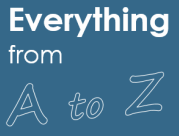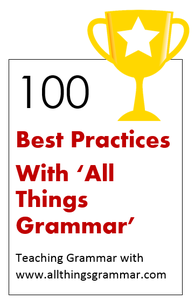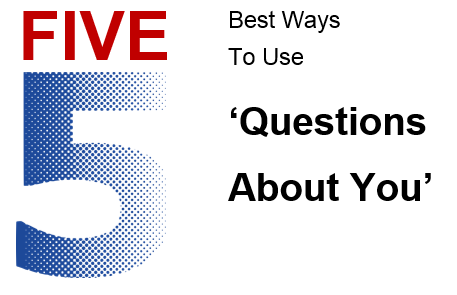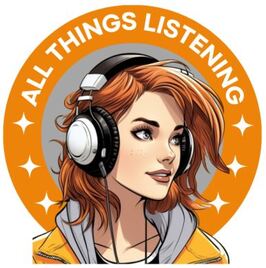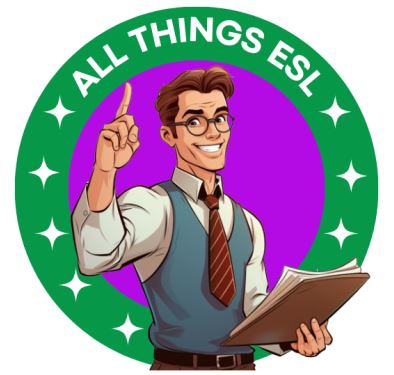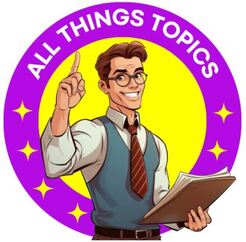Oh, the things you can do with a handful of questions! Sprinkled throughout this site, you'll find simple worksheet files called QUESTIONS ABOUT YOU with eight questions that focus on the learner's own experiences, questions like: "What did you do yesterday?" and "What time did you go to bed last night?"
There's nothing wrong with going 'old school' and assigning these worksheets as homework to wrap up lessons, and ensuring that your learners understand (more or less) the grammar covered. But if you're looking for something a bit different, look no further. Here are five best (alternative) ways to use 'Questions About You'
There's nothing wrong with going 'old school' and assigning these worksheets as homework to wrap up lessons, and ensuring that your learners understand (more or less) the grammar covered. But if you're looking for something a bit different, look no further. Here are five best (alternative) ways to use 'Questions About You'
1. Guessing Game
Ask your learners to leave the 'name space' blank. Your learners then answer the questions in class, or at home - if assigned as homework. Make sure they use complete sentences using the specified grammar. When finished, collect the papers and use them as the basis for guessing game - basically, who wrote the papers. Here are just two possibilities:
A)
After collecting the papers, tape them to the walls around your classroom and have your students walk around and read the answers - and let them try to guess who wrote what.
B)
After collecting the papers, randomly redistribute them to your students. Your students then stand up and ask their classmates the questions on the paper in an attempt to find the author. This is more difficult (and perhaps interesting) than the above method because (1) many of their classmates will give similar answers to those written on the paper; and (2) the author of the paper may not accurately recall what she originally wrote as her answer!
Ask your learners to leave the 'name space' blank. Your learners then answer the questions in class, or at home - if assigned as homework. Make sure they use complete sentences using the specified grammar. When finished, collect the papers and use them as the basis for guessing game - basically, who wrote the papers. Here are just two possibilities:
A)
After collecting the papers, tape them to the walls around your classroom and have your students walk around and read the answers - and let them try to guess who wrote what.
B)
After collecting the papers, randomly redistribute them to your students. Your students then stand up and ask their classmates the questions on the paper in an attempt to find the author. This is more difficult (and perhaps interesting) than the above method because (1) many of their classmates will give similar answers to those written on the paper; and (2) the author of the paper may not accurately recall what she originally wrote as her answer!
2. Pair Work Discussion Practice
Before your learners write their answers, tell them to write lies for two of the questions. They then pair up with a classmate and and ask and answer the questions - however, in order to find out which sentences are not true, your learners will have to ask plenty of follow up questions. Make sure that the guesses (as to which answers are false) are given to their classmate only after all the answers have been discussed - good modelling is essential before the activity begins.
Before your learners write their answers, tell them to write lies for two of the questions. They then pair up with a classmate and and ask and answer the questions - however, in order to find out which sentences are not true, your learners will have to ask plenty of follow up questions. Make sure that the guesses (as to which answers are false) are given to their classmate only after all the answers have been discussed - good modelling is essential before the activity begins.
3. Famous Person Interview
Before your learners write their answers, tell them to imagine that they are a famous person (you might prepare slips of paper with famous people's names on them, or you might let them choose famous people on their own). This will undoubtedly add tons of interest as your learners finally read aloud their answers to the other members of the class (as a wrap up).
Before your learners write their answers, tell them to imagine that they are a famous person (you might prepare slips of paper with famous people's names on them, or you might let them choose famous people on their own). This will undoubtedly add tons of interest as your learners finally read aloud their answers to the other members of the class (as a wrap up).
4. Real Person Interview
This activity is similar to the one above except that your learners can interview a real person. That person might be (1) a friend or family member, if taken home as homework; (2) a classmate; (3) a student from another classroom. Wrap up as in the above activity.
This activity is similar to the one above except that your learners can interview a real person. That person might be (1) a friend or family member, if taken home as homework; (2) a classmate; (3) a student from another classroom. Wrap up as in the above activity.
5. Extend the Answers
Ask your students to write longer sentences by continuing each sentence with conjunctions such as 'because' or 'so' or 'but'. For example, answers to "What did you do yesterday?" may look like this:
"I went shopping because I wanted to buy a present for my sister."
"I went shopping, so I don't have any money today."
"I went shopping, but I forgot to bring enough money."
This exercise is especially useful for writing students (have your students use the back of the papers, or use another sheet of writing paper).
Ask your students to write longer sentences by continuing each sentence with conjunctions such as 'because' or 'so' or 'but'. For example, answers to "What did you do yesterday?" may look like this:
"I went shopping because I wanted to buy a present for my sister."
"I went shopping, so I don't have any money today."
"I went shopping, but I forgot to bring enough money."
This exercise is especially useful for writing students (have your students use the back of the papers, or use another sheet of writing paper).
You can download all 10 'QUESTIONS ABOUT YOU' worksheets now available (as of the time of this blog post) by visiting the Grammar Target pages, or simply by clicking on the links below.
... with more QUESTIONS ABOUT YOU worksheets on the way. :)
Next time, the '100 Best Practices' blog looks at the best ways to use the "Grammar Board Games".
